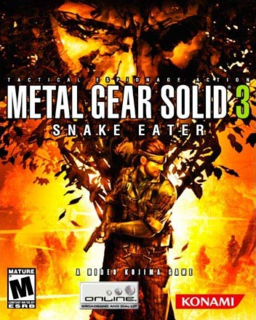One-Eyed Jack
Kojima follows this premise of the lone soldier in an hostile environment with absolute clarity: never has stealth made more sense than in "Snake Eater", as the dense foliage and tree-lines serve as the perfect habitat for an invisible assassin. You really have to play the part of the cautious, ever-planning killer: slowly crawling by unseen, assessing the surroundings with your senses, peering the jungle with its lush greens, dark browns and all-encompassing blinding hot sunlight, listening to the chirping birds and croaking frogs and streaming creeks, until you can hear the faint sound of the steps of a soldier trampling the vegetation, and then you wait and wait and wait some more, until he passes by you while you're hiding in the grass completely camouflaged and you finally strike death upon him, swiftly and silently, so that nature remains unturned and unsettled. It's in these moments of pure stealth that "Metal Gear Solid 3″ clicks and resembles Kojima's masterpiece. The bosses, after the debacle of "Sons of Liberty", also show a return to good form, with some memorable battles: the sniper duel with the End being the blossoming of the potential of the original battle with Sniper Wolf, and the confrontation with Sorrow showing off Kojima in his most enigmatic and allegorical, pitting Big Boss against an already dead enemy.
There are many reasons to adore "Metal Gear Solid 3″, which is why it becomes so troubling to understand exactly who is the man behind the game. Kojima is capable of so much, yet wastes all that creativity and effort with his petty idiosyncrasies. There's the toilet humor, the cartoonish hyperboles, the self-indulgent 60's pop references and the constant playing with "Metal Gear" cannon – all of these compromising the depth of the characters and storyline. But where Kojima's excesses become simply unacceptable is in the game-play. For the player to have access to all those cool, but insignificant, gadget-y details Kojima puts in his games, every little button in the control pad has a dozen of different uses, making the control scheme a maximalist mess. Add an overview camera that is ill-fitted for the new setting and you have a number of issues that will constantly break up immersion. It becomes obvious that Kojima's crew never thought of re-designing the original "MGS" style of game-play, and just kept adding stuff as they went by, to the point it became nigh unplayable. Simplification and streamlining would have done wonders for "Snake Eater", as the later "Subsistence" and "Guns of the Patriots" would show.
"Snake Eater" certainly has a more mature set of characters, and emotionally evocative storyline than its direct predecessor, which is why if it were not for Kojima's obnoxious eccentricities, it might very well have been the rightful successor to the original "Metal Gear Solid". But the truly infuriating thing is how its insignificant flaws can obfuscate the game's grandiosity when it strikes that rare chord of pure bliss. Flaws that could have easily been removed, but remain as nagging reminders of Kojima's unflinching desire to be cool and witty. Which is why Kojima needs an editing eye, something which he must surely have had many years ago, but now seems to have lost, like his protagonists, during some imaginary war with his ego. And until he learns that less is more, he will remain blind.

